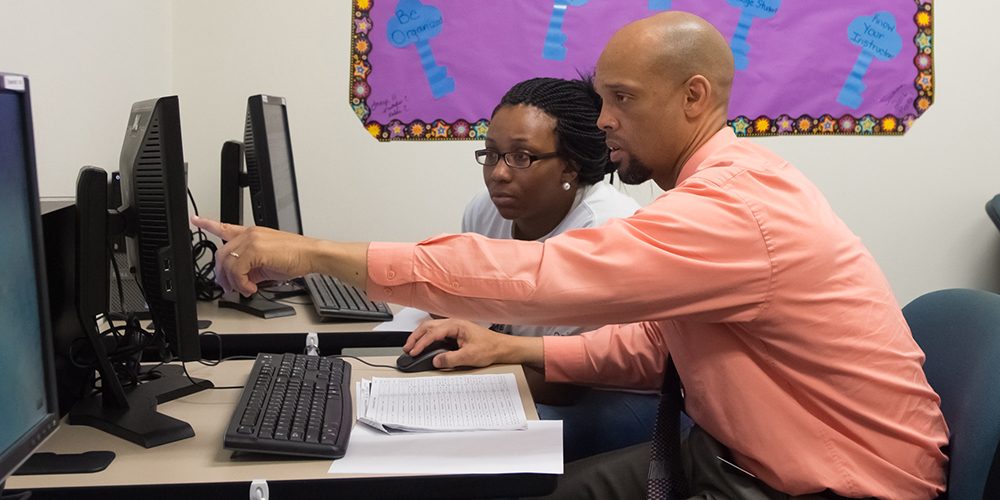ECC Receives $2 Million Grant to Support Student Success

Sherrod Sumner, coordinator of the Student Success Center on the Tarboro campus, helps Shatyra Barnes register for spring classes at Edgecombe Community College. Student Success Centers have been established on both campuses thanks to a $2 million grant from the U.S. Department of Education Predominantly Black Institutions Program.
Edgecombe Community College is scheduled to receive more than $2 million over the next five years to help increase the college’s retention and graduation rates of low-income and African American students.
Funded by the U.S. Department of Education, the Predominately Black Institution grant of $2,047,745 will fund, among other things, two Student Success Centers – one on the Rocky Mount campus and the other on the Tarboro campus.
College officials have dubbed the project Providing Students The Edge.
“Though this is a Predominately Black Institution grant, this is not just a grant for African American students,” says Tony Rook, dean of enrollment management at Edgecombe Community College. “It’s for all of our students.
“It’s an infrastructure-improving grant, and it will strengthen our services that we provide for our entire student population.”
To be eligible for the grant, a college’s student population must be more than 50 percent African American. African American students at Edgecombe Community College make up 65 percent of the student body.
After receiving word that ECC would receive the grant, college leaders converted two spaces that were being used as advising rooms on each campus. These Student Success Centers now offer resources for students who meet certain criteria, says Kenneth Jones, coordinator for the Rocky Mount Student Success Center.
“Our goal is to ensure that students have the necessary resources and support to stay in college, graduate, or transfer to other institutions of higher learning,” Jones explains.
Students who met certain criteria prescribed by the grant are part of a cohort that began this fall and will be tracked until credential completion. Criteria include such circumstances as the student must be enrolled in college for the first time or the student must be a first generation college student. Subsequent cohorts will begin each fall of the next four years.
The Student Success Centers are key to serving students identified under the grant. But the centers will serve all of the college’s students.
“We help every student who walks in our door,” Jones says. “We want to make sure every student is successful.”
Rook says the college is taking a hands-on approach in the new Student Success Centers, providing case management services, tutoring, help with registration, and counseling to students.
“In these tough economic times, we are glad to be able to provide these services to our students,” Rook says.
Services provided in the Student Success Centers include:
- Application assistance
- New Student Orientation assistance
- Registration/Self-Service assistance
- Student planning
- Goal setting
- Access to tutoring and tutorial software
- Individualized support services
- Scholarship application assistance
In addition to the Student Success Centers, the grant also will be used for computer software so faculty and staff can better monitor students’ progress. If students fall behind in their work, instructors and Student Success Center staff will be able to intervene sooner in an effort to help them get back on track, Rook explains.
Faculty and staff also will undergo professional development training to help them get a better understanding of the issues that come with being first-generation, first-time, low income, or minority students.
In addition, the grant will provide for coordination of clubs and activities for low income and minority students.
Although the Student Success Centers have been operating for just a short time, Rook says he’s heard positive feedback already.
“I’ve seen rapport-building,” he says. “Students are feeling comfortable coming in, and we’ve had more traffic than we anticipated.
“Relationships are being created, and that’s the number one indicator of student success.”
